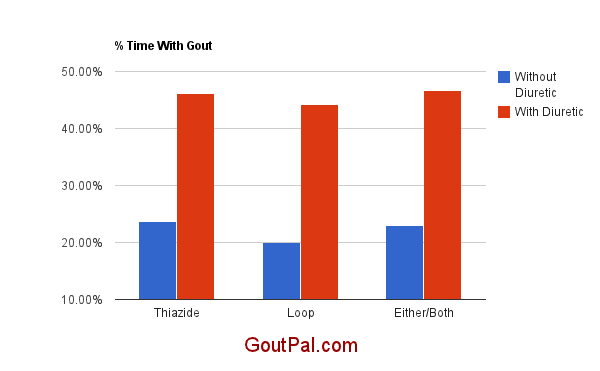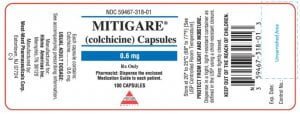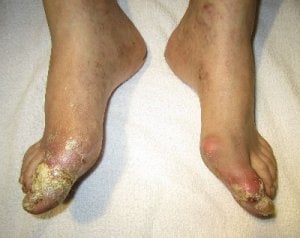This is a review of a study which indicates that diuretics cause gout. It is one of a growing number of gout studies that provide evidence of reasons for gouty arthritis.
I have extracted the main ideas from the published gout investigation to present these in a more readable format suitable for unqualified gout sufferers. Inevitably, such scientific reporting will still include technical references. I will refer to my gout glossary for further explanation. If you encounter a term you do not understand, you should search for it using the search box above. If that does not provide an adequate explanation, then please ask in the feedback section below.
Diuretics Cause Gout Report Abstract
This is a layman’s summary of:
- Title
- Recent diuretic use and the risk of recurrent gout attacks: the online case-crossover gout study.
- Authors
- Hunter DJ, York M, Chaisson CE, Woods R, Niu J, Zhang Y.
- Published
- J Rheumatol. 2006 Jul;33(7):1341-5. Epub 2006 Jun 1.
Objective
To assess several supposed risk factors, including thiazide and loop diuretics use, thought to trigger recurring gout attacks.
Methods
We conducted an internet-based case-crossover study involving subjects who had a gout attack within the past year. Patients were recruited online and asked to provide access to medical records. Data were obtained on specific diuretic use on each day over the 2-day period prior to a gout flare (hazard period) and on each day of 2 days between gout attacks (control period). We examined the relation of all diuretic use and use of specific diuretics, i.e., thiazide and loop, to the risk of recurrent gout attacks using a conditional logistic regression model adjusting for alcohol consumption and purine intake.
Results
One hundred ninety-seven subjects completed both control and hazard period questionnaires. Participants were predominantly male (80%) and over half had a college education. The average time between onset of gout attack and logging on to the website was 2 days. Adjusting for alcohol consumption and purine intake, the odds ratio (OR) for recurrent gout attacks from all diuretic use over the last 48 h was 3.6 (95% confidence interval 1.4–9.7). OR of recurrent gout attacks were 3.2 and 3.8 for use of thiazide and loop, respectively.
Conclusion
Recent use of diuretics is associated with a significantly increased risk for recurring gouty arthritis. The increased risk of gout attacks from either thiazide or possibly loop diuretic therapies represents an important modifiable risk factor in patients with gout.
Diuretics Cause Gout Report
Background
The report starts with a background explanation of increasing incidence of gout, affecting around 1% of Americans[1 – 2]. It notes that gout often recurs, with progressive disability and joint damage[3 – 5]. Many previous studies have investigated risks of the onset of gout [3],[6 – 10], but this one focuses on recurring attacks. In particular, it raises the known issues concerning medicines typically supplied for high blood pressure, especially thiazides and loop diuretics[11 – 22].
Study Design
The gout research team recruited qualifying gout patients[23] via the Internet. Subjects completed questionnaires for one year during gout attacks and gout-free (intercritical) periods. I.e. each case crosses over from one condition to another, eliminating variables introduced by having separate groups of subjects.
In addition to several gout questions, the questionnaires asked about use of other medications:
Did you take any of the following diuretics (‘water pills’) yesterday or the day before yesterday?
- For high blood pressure
- Hydrochlorothiazide or thiazide. Brand names including:
- Dyazide
- Esidrix
- Hydrodiuril
- For heart failure
- furosemide (“loop” diuretics). Brand names including:
- Lasix
- Other
- amiloride, spironolactone, or triamterene. Brand names including:
- Midamor
- Aldactone
- Dyrenium
Other factors, such as purine and alcohol intake, were included. This may cloud the issue, but as this is a statistical study, their inclusion is valid[24 – 25].
Results

The results show a big rise in the number of gout attacks when gout patients were taking diuretics compared to periods when they did not take them. The report includes odds ratio data, but my view is that such a detailed statistical view is not necessary here. We can see clearly that these diuretics are a reason for gout. Therefore, it makes sense to ask your doctor for an alternative treatment.
Discussion
The report ends with a discussion of the points raised by the investigation. Most of these are of interest to the scientific community, but not valuable to the gout sufferer[26 – 28]. The significant point is that the problem of diuretics for gout sufferers is easily overcome because there are widely available alternatives.
The gout report concludes:
In summary, we found that recent use of thiazide and possibly loop diuretics was associated with a significantly increased risk for recurrent gouty arthritis. Despite the well-known association of gout and diuretics, a relatively large proportion of our patient population with preexisting gout was prescribed this class of antihypertensive therapy. Given the wide availability of alternative effective agents for the treatment of hypertension and congestive heart failure, clinicians have ample ability to individualize management for this population. So they could reduce the risk of recurrent gout attacks by avoiding the use of thiazide and possibly loop diuretics in persons with preexisting gout.
Diuretics Cause Gout: Next Steps
As you can see, diuretics are bad for gout. In extreme cases, they may be the sole cause of your gout, and changing your medication may be the only thing you need to do.
Do not stop taking them without consulting your doctor. There are many alternatives to diuretics for treating high blood pressure and heart disease. It is important to get your uric acid tested and ensure that you get it down to 5 mg/dL (0.30 mmol/L) or below. If switching diuretics to something else does not lower your uric acid low enough, then you should arrange for uric acid treatment.
I'm working on templates that help you identify, understand, and resolve concerns about diuretics causing gout. In the meantime, you can start by adding notes about what you've learned about diuretics causing gout so far.
All you do is highlight any text that interests you. Then click "Annotations" to personalize any GoutPal page. Which means you can keep diuretics notes linked here, where you can always find them.
Do you need help with annotations? Or other unanswered questions or unresolved concerns? Then please tell me below. Or, if you prefer to use email, then subscribe to my free newsletter.
Leave Diuretics Cause Gout to browse more evidence for causes of gouty arthritis. Or return to Gout Progression Phase 1: Gout Causes.
Diuretics Cause Gout Comments
Please add your comments here. Or see more feedback options below.
Your feedback options are:
- Easy Gout Comments. Add comments above.
- Focused Gout Concerns. Create a new issue about any gout concern that you want to resolve. Or join an existing issue.
- General Gout Chat. Start a new discussion about any gout topic that interests you. Or join an existing discussion.
- Versatile Gout Annotations. Annotations allow you to personalize GoutPal pages to help you learn. But they also work as a feedback option. Especially if you use the Public Group, the GoutPal Links Subscriber Group, or a GoutPal Project Group. For more information, I recommend that you subscribe to my free newsletter.
If you are asking a question, it is best to:
- Search for that question in the GoutPal Search Engine first.
- Choose the most relevant result.
- Refer to that result as you ask your question.
Diuretics Cause Gout Related Topics
Does Lasix Cause Gout?
Where gout sufferers need diuretics for comorbidities, their uric acid treatment program becomes more complicated. So, there are more choices to make during the shared decision-making processes during Gout Progression Phase 5: Start Uric Acid Cure and Gout Progression Phase 6: Adjust Uric Acid Cure.
But we also need to consider diuretics during Gout Progression Phase 1: Gout Causes. Because there is a lot of evidence that some diuretics can cause gout. Yet, I learned in my gout forum long ago that different diuretics affect uric acid in different ways. And even the order in which you take them has a significant effect on uric acid levels in the blood.
So the science is complicated. Therefore, you might want to leave it to the experts as you consult specialists about diuretics and gout. But if you want to take your rightful place in shared decision-making processes, I can explain many of the questions you need to ask. And help you understand your choices that derive from the answers. But first I need to assess how much interest there is in having a template for diuretics and gout. Or do you prefer individual templates? For example, I'm asked by hundreds of gout sufferers, "does Lasix cause gout?"
Now, there is no straightforward answer to that question. Yet, a template can guide you through the decisions that you and your medical team must make. But I need a few interested gout sufferers that I can work with to develop an effective template. Meanwhile, I'll start collecting evidence and assessing interest. Here, and in old forum topics such as Lasix and Gout.
Please tell me your take on, "does Lasix cause gout". Using your feedback options above.
Diuretics Cause Gout References
| Title | Author(s) | Published | Link |
|---|---|---|---|
| Estimates of the prevalence of arthritis and selected musculoskeletal disorders in the United States. | Lawrence RC, Helmick CG, Arnett FC, et al. | Arthritis Rheum 1998;41:778-99. | |
| Gout: on the brink of novel therapeutic options for an ancient disease. | Bieber JD, Terkeltaub RA. | Arthritis Rheum 2004;50:2400-14. | |
| The past four decades of progress in the knowledge of gout, with an assessment of the present status. | Gutman AB. | Arthritis Rheum 1973;16:431-45. | |
| Clinical practice. Gout. | Terkeltaub RA. | N Engl J Med 2003;349:1647-55. | |
| Review: systemic toxicity associated with the intravenous administration of colchicine — guidelines for use. | Wallace SL, Singer JZ. | J Rheumatol 1988;15:495-9. | |
| Incidence and risk factors for gout in white men. | Roubenoff R, Klag MJ, Mead LA, Liang KY, Seidler AJ, Hochberg MC | JAMA 1991;266:3004-7. | |
| Racial differences in the incidence of gout. The role of hypertension. | Hochberg MC, Thomas J, Thomas DJ, Mead L, Levine DM, Klag MJ. | Arthritis Rheum 1995;38:628-32. | |
| Asymptomatic hyperuricemia. Risks and consequences in the Normative Aging Study. | Campion EW, Glynn RJ, DeLabry LO. | Am J Med 1987;82:421-6. | |
| Alcohol intake and risk of incident gout in men: a prospective study. | Choi HK, Atkinson K, Karlson EW, Willett W, Curhan G. | Lancet 2004;363:1277-81. | |
| Purine-rich foods, dairy and protein intake, and the risk of gout in men. | Choi HK, Atkinson K, Karlson EW, Willett W, Curhan G. | N Engl J Med 2004;350:1093-103. | High Purine Foods |
| Chlorothiazide (Diuril) as a hyperuricacidemic agent. | Oren B, Rich M, Belle M. | JAMA 1958;168:2128-9. | |
| Physiologic and clinical observations on furosemide and ethacrynic acid. | Laragh JH, Cannon PJ, Stason WB, Heinemann HO. | Ann NY Acad Sci 1966;139:453-65. | |
| Obesity, weight change, hypertension, diuretic use, and risk of gout in men: the health professionals follow-up study. | Choi HK, Atkinson K, Karlson EW, Curhan G. | Arch Intern Med 2005;165:742-8. | Obesity And Gout |
| Thiazide diuretics and the initiation of anti-gout therapy. | Gurwitz JH, Kalish SC, Bohn RL, et al. | J Clin Epidemiol 1997;50:953-9. | |
| Predicting acute gout in diuretic-treated hypertensive patients. | Waller PC, Ramsay LE. | J Hum Hypertens 1989;3:457-61. | |
| Gout. | Rott KT, Agudelo CA. | JAMA 2003;289:2857-60. | |
| Incidence of diabetes and gout in hypertensive patients during 8 years of follow-up. The General Practice Hypertension Study Group. | Grodzicki T, Palmer A, Bulpitt CJ. | J Hum Hypertens 1997;11:583-5. | |
| Hypertension in the metabolic syndrome and diabetes: pathogenesis, clinical studies, and treatment. | Izzo JL Jr. | J Clin Hypertens 2003;5 Suppl 4:3-10. | |
| Guidelines for antihypertensive treatment: an update after the ALLHAT study. | Salvetti A, Ghiadoni L. | J Am Soc Nephrol 2004;15 Suppl 1:S51-S54. | |
| Trends in prevalence, awareness, treatment, and control of hypertension in the United States, 1988-2000. | Hajjar I, Kotchen TA. | JAMA 2003;290:199-206. | |
| Seventh report of the Joint National Committee on Prevention, Detection, Evaluation, and Treatment of High Blood Pressure. | Chobanian AV, Bakris GL, Black HR, et al. | Hypertension 2003;42:1206-52. | |
| Top 200 most prescribed drugs of 2003. | Mosby’s Drug Consult. | New York: Elsevier; 2003. | |
| Preliminary criteria for the classification of the acute arthritis of primary gout. | Wallace SL, Robinson H, Masi AT, Decker JL, McCarty DJ, Yu TF. | Arthritis Rheum 1977;20:895-900. | |
| [Total purine content in selected foods.] | Wolfram G, Colling M. | Z Ernahrungswiss 1987;26:205-13. | |
| A unified approach to the analysis of case-distribution (case-only) studies. | Greenland S. | Stat Med 1999;18:1-15. | |
| Evaluation of renal handling of uric acid in essential hypertension: hyperuricemia related to decreased urate secretion. | Tykarski A. | Nephron 1991;59:364-8. | |
| The phlogistic potential of urate in solution: studies of the phagocytic process in human leukocytes. | Malawista SE, Van Blaricom G, Cretella SB, Schwartz ML. | Arthritis Rheum 1979;22:728-36. | |
| Recommendations for the management of special populations: racial and ethnic populations. | Ferdinand KC. | Am J Hypertens 2003;16(11 Pt 2):50S-54S. |
Please give your feedback
Did this page help you? If yes, please consider a small donation. Your donations help keep GoutPal's gout support services free for everyone.
If not, please tell me how I can improve it to help you more.








